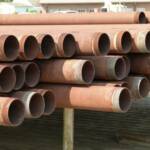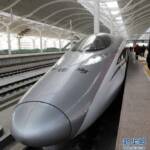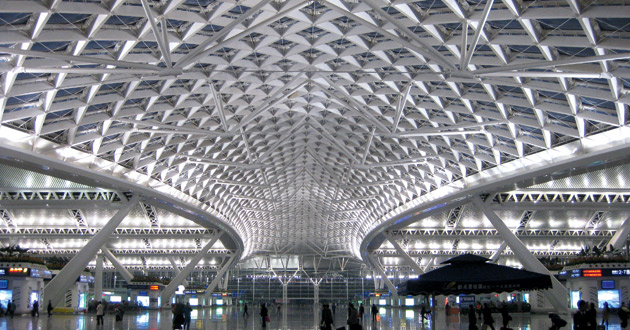Keystone XL vs. High Speed Rail -- Tale of Two Job Creators
Posted: 03/ 7/2012
Huffington Post
John DeCock.Environmental Activist And Writer
It appears that the interests behind the looming environmental disaster known as the Keystone XL pipeline are confident that they will be victorious in their continuing quest to have this pipeline built. No presidential order or trivial vote in Congress will deter them from exploiting the commons for still more profit and destruction.
Like so many bad ideas, this is being sold as a job creator. "America needs the construction jobs this pipeline will provide, dammit." It is being sold as a solution to energy problems. "Gas is almost five bucks a gallon! We need domestic oil production, dammit! Get out of the way, we're coming through with this thing and it's for your own good." But how does it really stack up in terms of job creation and easing pressure on gas prices?
Underlying this project are two facts: First, extracting the oil from tar sands in Canada will destroy vast, unspoiled regions and ecosystems. It cannot be credibly argued that this is the not the case, only that it is somehow worth it. Second, the greenhouse gas produced by exploiting one of the most dirty, polluting sources of energy available will essentially overwhelm any human efforts to mitigate climate change. Unless you are adept at ignoring science, these two facts are established. Because there are many here among us who are adept at ignoring science, or willing to be led away from considering consequences by greed or ideology, we are forced to address the two canards being used to advance this thing.
The jobs which will be created by the pipeline are few in number and temporary. TransCanada, the company behind the pipeline, claims 20,000 jobs will be created. Although that is a fairly humble number of jobs for which to sacrifice the future of the planet, it is greatly overstated. The Chamber of Commerce advances the fanciful notion that the pipeline will create "250,000" permanent jobs. Yee haw! However the United States State Department sees things differently. They project 5,000-6,000 jobs U.S. jobs. But wait there's more! An analysis by the Cornell University Global Labor Institute sites even lower projections. They project only 500 to 1400 temporary construction jobs. Their projections are burdened by rigorous research and analysis so they cannot be as optimistic as TransCanada who would make billions of dollars in revenue.
That's not to say that jobs won't be created. They just won't be created in the U.S. This leads us to the second point. The oil extracted at great cost to all of us will not be for the United States market. Most of this oil is being exported, along with the jobs they will create. The pipeline ends at a sea port city for a reason. The Keystone XL pipeline won't do a damn thing about gas prices, but there are those who find comfort in fantasy.
The pipeline is a project of a corporation, albeit one that would likely receive public subsidies. That means a profit must be built into the project and anything that mitigates the scale of the profit, such as responsibility toward humankind, reduces that profit and interferes with progress toward the most important goal of the project. Let's compare that with another gigantic construction project -- High Speed Rail.
By contrast, High Speed Rail is a government funded project, spurred by Recovery Act grants. The purpose of this project is to establish efficient alternatives to airplane and car travel, reducing greenhouse gases and lowering the cost and inconvenience of travel. There is no profit built into the model, it's designed to provide transportation. It will create construction jobs and permanent jobs operating the trains and systems, along with indirect jobs generated by business which provide service to the rail system and travelers.
As the network of High Speed Rail systems grows, so will the jobs and the reduction in carbon emissions. In theory, High Speed Rail has the potential to run on electricity that is generated entirely by alternative sources which do not contribute to global warming. In fact, there is substantial interest, enthusiasm and initiative to build the systems in just that manner. High Speed Rail creates jobs across the spectrum from blue collar construction to the cutting edge of high tech.
The job creation potential of High Speed Rail completely dwarfs even the most optimistic, and frankly, false projections of job creation from Keystone XL. In citing just one area of job creation, the American High Speed Rail Alliance sees enormous potential and serious obstacles to prosperity:
Talgo, a Spanish rolling stock manufacturer, is already manufacturing HSIPR train sets in the United States and purchases the majority of train parts from 250 separate American companies located in 30 states. The establishment of Talgo's new facility in Milwaukee created 125 direct manufacturing and maintenance jobs and 450 initial indirect manufacturing jobs. Talgo estimates that a $1 billion investment in passenger rail creates 30,000 jobs. However, amid Wisconsin's rejection of passenger rail funds and the overall setback in HSIPR funding, Talgo may be forced to shut down their manufacturing facility as early as fall 2012.
Ideological opposition to a government funded source of job creation and small business success has stifled the establishment of High Speed Rail projects in many places and slowed down progress in others. However the massive public subsidy provided by the destruction of the commons through projects like Keystone XL on the thin premise that it is a job creating dynamo, is considered just dandy by the same ideologues.
An honest dialogue about energy, jobs, infrastructure and our common responsibility to protect global resources would result in a very different choice of which job creation project makes the most sense.
As the Senate gets ready to vote on yet another attempt to pass Keystone XL legislation, contact your Senator and ask they why they would sacrifice our future for Canadian billionaires instead of developing energy efficient transportation which will create many thousands of permanent jobs. They'll either tell you they get it or they will tell you a lie.
"Like so many bad ideas...
but how does it really stack up in terms of job creation and easing pressure on gas prices?"
Click on Image to Enlage Photo
 | ||||











